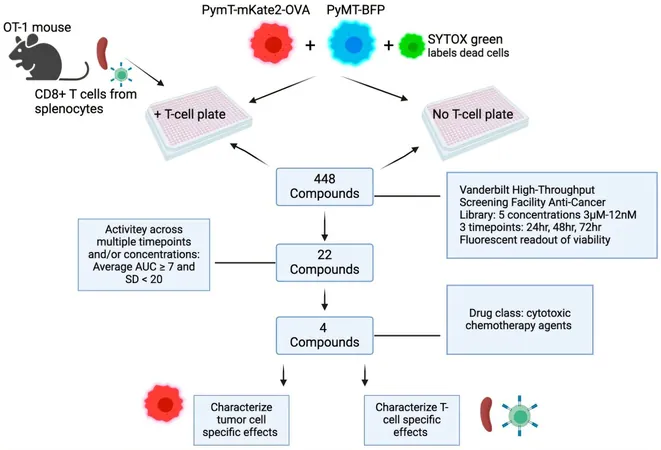
mKRAS ctDNA: The Game-Changer in Predicting Metastasis and Survival in Pancreatic Cancer!
2025-03-25
Author: Daniel
Introduction
In a groundbreaking study by Mayo Clinic researchers, the presence of mutant KRAS (mKRAS) circulating tumor DNA (ctDNA) in plasma and peritoneal fluid has been identified as a key predictor for metastatic progression and survival in patients diagnosed with localized pancreatic ductal adenocarcinoma (PDAC). This crucial biomarker not only enhances understanding of the disease but significantly informs treatment decisions for affected individuals.
Study Findings
The study's results are staggering. Among those patients who underwent baseline ctDNA mKRAS testing, it was discovered that individuals with plasma mKRAS positivity had a shocking 46% likelihood of experiencing early postoperative recurrence or death within six months of resection, compared to just 13% of those without plasma mKRAS (P <.001). Additionally, positive plasma mKRAS status correlated strongly with the likelihood of developing metastatic disease—78% in mKRAS-positive patients compared to 49% in mKRAS-negative patients (P <.001). Survival rates were also significantly lower; only 20% of plasma mKRAS-positive patients were alive at follow-up versus 58% of their mKRAS-negative counterparts.
Peritoneal Fluid mKRAS Testing
But it doesn’t stop there. The research extended to the evaluation of peritoneal fluid mKRAS testing. Patients with positive peritoneal mKRAS results exhibited a dramatically increased rate of clinically positive staging at laparoscopy (53% vs. 12%; P <.001), along with a higher likelihood of metastatic disease down the line (67% vs. 42%; P < .001). When combining these data points, the overall chance of experiencing metastatic disease or death at follow-up soared to 76% for those with positive peritoneal mKRAS results, contrasting with 53% in those without (P <.001).
Expert Insights
Jennifer Leiting, MD, the first author of the study and a hepatobiliary and pancreatic surgeon at Mayo Clinic, emphasized the study's importance by stating, "Historically, we've known that KRAS mutations are associated with more aggressive pancreatic cancer. However, this large-scale study enhances our ability to interpret test results and apply them to improved patient care."
Study Design
The study design saw an analysis of data from 785 nonmetastatic PDAC patients who underwent mKRAS testing between January 2018 and May 2022. With a median follow-up period of 16 months, researchers sought to evaluate the progression to metastatic disease and survival outcomes within this cohort. Out of the patients assessed, 95% (743) received baseline plasma mKRAS testing. While 86% were mKRAS-negative, a notable 14% were mKRAS-positive. Among the mKRAS-positive group, a higher incidence of clinically positive laparoscopy results (33% vs. 21%) was observed, along with fewer patients undergoing surgical resection (11% vs. 34%; P < .001). Additionally, peritoneal mKRAS testing was performed on 53% of the cohort, revealing that 29% of these patients were also mKRAS-positive.
Call to Action
Notably, there is now a call to action for broader testing protocols, as approximately half of the patients underwent tests for both plasma and peritoneal mKRAS. The outcomes for those with positive mKRAS status—irrespective of test location—indicate markedly poorer prognoses, underscoring the critical need for comprehensive diagnostic evaluations in managing this lethal cancer.
Conclusion
Mark Truty, MD, a senior author of the study and a pancreatic surgical oncologist, expressed his excitement over the findings, stating, "This represents a significant advancement for pancreatic ductal adenocarcinoma. We have had access to genetic testing for several years, but now we can truly interpret and utilize these results to make tailored treatment decisions." As advancements in genetic testing continue to evolve, patients confronting the harsh realities of pancreatic cancer can now find hope amid diagnosis frustrations. This study heralds a new era where understanding genetic mutations not only empowers informed treatment strategies but also offers a glimmer of optimism for improved outcomes. Stay tuned as the medical community rallies around these promising developments—who knows what the future holds for pancreatic cancer treatment!


 Brasil (PT)
Brasil (PT)
 Canada (EN)
Canada (EN)
 Chile (ES)
Chile (ES)
 Česko (CS)
Česko (CS)
 대한민국 (KO)
대한민국 (KO)
 España (ES)
España (ES)
 France (FR)
France (FR)
 Hong Kong (EN)
Hong Kong (EN)
 Italia (IT)
Italia (IT)
 日本 (JA)
日本 (JA)
 Magyarország (HU)
Magyarország (HU)
 Norge (NO)
Norge (NO)
 Polska (PL)
Polska (PL)
 Schweiz (DE)
Schweiz (DE)
 Singapore (EN)
Singapore (EN)
 Sverige (SV)
Sverige (SV)
 Suomi (FI)
Suomi (FI)
 Türkiye (TR)
Türkiye (TR)
 الإمارات العربية المتحدة (AR)
الإمارات العربية المتحدة (AR)